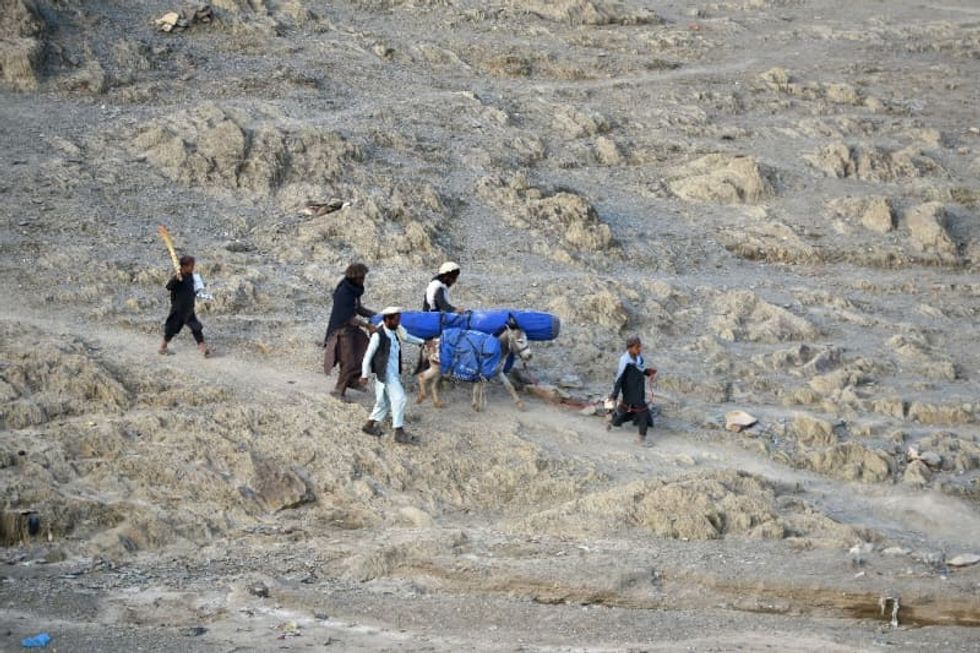The U.S. Immigration and Customs Enforcement (ICE) detainment of J.R. Tucker High School student Armand Momand constitutes a constitutional outrage.
Because of his father’s service to the U.S. government in Afghanistan, Momand has legal U.S. immigration status. Yet ICE agents took him into custody Aug. 8 after convictions in an Henrico County court for driving more than 20 miles an hour over the speed limit and disorderly conduct, both misdemeanors.
Now, the government that Momand’s father risked his life to serve in fighting terrorism wants to deport his 19-year-old son, despite the young man’s lawful presence in the United States.
The deportation debacle ordered by President Donald Trump has turned into a nightmare of lies and unconstitutional behavior.
Trump’s demonization of immigrants in the name of nationalism doesn’t get much worse than betraying those who placed themselves in harm’s way to support this country.
On its website, ICE lists criminal convictions which would cause the service to detain an immigrant because they pose “a public safety or national security threat.”
The list includes burglaries and robberies. It includes kidnapping, homicide, sexual assault, and weapons offenses. It includes drug trafficking, and human trafficking.
What the list does not include are Momand’s convictions for reckless driving for going more than 20 miles an hour over the speed or misdemeanor disorderly conduct, a charge which prosecutors reduced from an original felony charge for eluding or disregarding police.
To detain an immigrant, federal law requires ICE to have “probable cause” to believe the immigrant has committed a federal crime or is illegally residing in this country.
Momand has done neither, his lawyer, Miriam Airington-Fisher, told me in an interview.
Public records that I looked at show that a Virginia district court judge gave Momand no jail time for his state convictions on August 8. Yet ICE detained him to consider for deportation.
According to Airington-Fisher, Momand is a legal resident of this country who is pursuing permanent legal status and eventually U.S. citizenship.
Momand was born in Afghanistan. Momand’s father received a Special Immigration Visa to bring his wife and children to America because he helped the U.S. military during its fight against Taliban terrorists in Afghanistan. The visas granted to Momand’s father and his family come with extensive vetting and reflect the deadly Taliban retribution faced by Afghanis who worked with Americans.
Virginia court records show no other criminal history for Momand. Airington-Fisher told me that is because the teenager has none. Ironically, Momand’s continued detention by ICE forced him to reschedule a green card interview set for Aug. 14, Airington-Fisher said.
ICE has offered no legal explanation for Momand’s imprisonment to his lawyers or family, Airington-Fisher added.
“We received a notice to appear at a hearing to initiate deportation,” she explained.
That Aug. 25 hearing was postponed because of a “crowded” court docket, Airington-Fisher told me a day later. Now, to argue for bond, Momand, a legal U.S. resident, must wait until a rescheduled hearing on Sept. 8. He must spend a month in a federal detention center and miss the first two weeks of school. This is what passes for a speedy trial in Trump’s nationalist crackdown on a legal teen immigrant.
Momand, his family, and lawyers remain “completely in the dark” about the legal justification for the young man’s imprisonment, Airington-Fisher said.
“ICE can’t dissolve his visa status,” Airington-Fisher told me. “We do not believe his detention is legal.”
The ICE detainee database shows Momand is being held at the Abyon Farmville Detention Center.
On Aug. 19, I asked ICE if Momand had been charged with any crimes, and if so, what crimes. The media office acknowledged my request, but has yet to get back to me with an answer.
“You can’t just arrest someone and then figure out whether they did anything wrong,” immigration lawyer Simon Sandoval-Moshenberg, a partner with the firm Murray Osorio, said in an interview on Aug. 19. “What was the probable cause to think this person committed a federal crime or was illegally in the country?”
Sandoval-Moshenberg represents Kilmar Armando Abrego Garcia, the man ICE seized and was mistakenly deported by the Trump administration to a brutal El Salvadoran prison in defiance of a federal court order.
As Momand’s Aug. 25 hearing was being postponed in Virginia, ICE was again detaining Abrego Garcia for deportation three days after a judge ordered his release from custody as he awaits trial on federal criminal charges by the Trump administration.
Sandoval-Moshenberg stressed that situations like Momand’s are very different from the Abrego Garcia case, which involves allegations of criminal felonies.
Momand’s case deals with basic constitutional rights such as being told of the charges against him and the right to a bond hearing so he could go to school between legal hearings and the constitutional requirement that the government must justify its legal right to deport him.
Most of all, Momand’s case involves the Trump administration’s detention of immigrants living legally in the United States without probable cause.
Finally, Momand’s case deals with Trump’s disrespect for the Special Immigration Visas meant to protect people who faced death constantly to help America fight ruthless terrorists. This is why the law provides Special Immigrant Visa holders an opportunity to get a green card and an eventual path to American citizenship.
Asked about Momand’s detention by journalists, Virginia Gov. Glen Youngkin treated the young man as a dangerous criminal who deserved to be in custody while he is investigated for charges that had already been litigated and resolved.
Youngkin got it backwards. And he took the position that misdemeanor convictions in a traffic incident qualify as proof of a national security risk.
Under Trump’s indiscriminate immigrant removal policies, immigrants can no longer rely on being in the U.S. legally to protect themselves from being harassed and possibly deported, Adam Bates, senior supervisory lawyer for the International Refugee Assistance Project, told me.
“People now do everything they are supposed to, but they get grabbed off the street for doing nothing wrong,” Bates told me.
I have met two Afghans who worked with the American government and who currently live in the U.S. One barely eluded capture by the Taliban as he set up forward communications systems for U.S. Marines. The other risked attack each day for translating in public for an American military contractor.
They, and others like them, worked knowing the fate of people like Sohail Pardis, an Afghani interpreter beheaded by the Taliban for aiding the American government.
The system for granting immigrants who helped America fight terrorism special visas is exhaustive and time-consuming.
For the Trump administration to now turn its back on foreigners who risked their lives on America’s behalf to pursue a nationalist deportation policy that demonizes all immigrants is cruel and self-destructive. The policy betrays constitutional and moral principles, not to mention national security.
“It is horrific the extent to which we put people in mortal danger to help with our war effort and then toss them aside like used candy wrappers,” said Sandoval-Moshenberg. “It is going to have disastrous long-term foreign policy consequences.”
In Virginia, the ICE handling of Arman Momand should also have consequences.
If it proves anything, it proves that immigrants are not and have never been America’s enemy.




